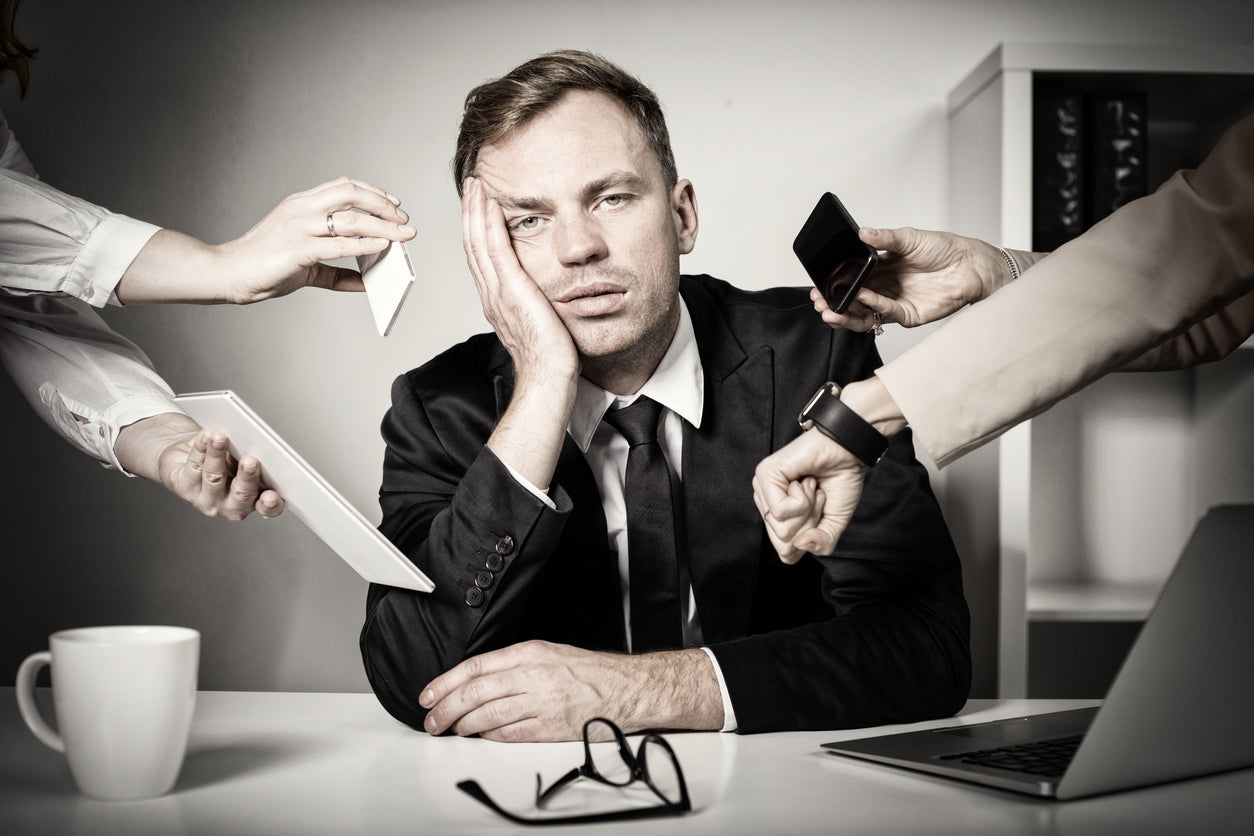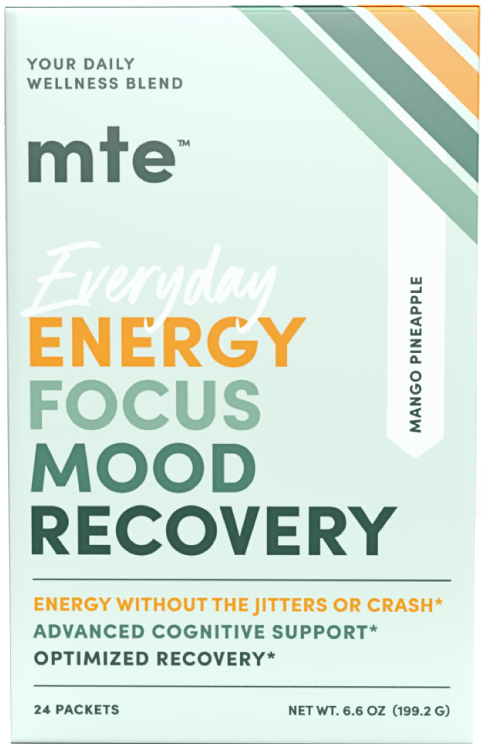
Ever Wondered Why You Always Feel Tired?
Besides “fine," “tired” might be the most common response to the polite, “How’s it going?” we squawk back and forth at each other every day. Why? Because it’s pretty much universal – you tell someone you’re tired, you’ll almost definitely get a nod or a “Me too.” in commiseration. Feeling fatigued is so commonplace it’s even got its own acronym: TATT for “tired all the time.”
Being exhausted has, to some extent, been romanticized in our society, whether it’s the surgeon who sleeps 4 hours a night or the busy exec who runs 12 miles after putting 12 hours in at the office. It must be totally normal to be fatigued, right? All the cool kids are doing it.
Well, the cool kids probably feel like crap, because 0/10 people enjoy walking through life in an irritable brain fog of wishing you could just go back to bed. No; it’s not normal to be unendingly fatigued. In all honesty, this idea that sleeping less, working more, and skipping lunch are values we should aspire to is deranged. What if we instead aspired to, like, meeting our responsibilities and then spending the rest of our time enjoying life?
Well, first, we’ve got to figure out why we’re tired in the first place. Spoiler: sleep isn’t nearly the only factor that factors in.
Why Energy & Exhaustion Aren’t Mutually-Exclusive
Here’s the thing about energy: you can consume all the stimulants in the world and still be fatigued. Well, actually, you’d be dead. RIP. But you get the point. There are a few things going on here, and we’ll use caffeine as an example since that’s the most common pick-me-up we reach for, whether it’s in energy drinks, coffee or tea.
Caffeine is a great example of that ism where you can’t cut the bottom off a blanket and sew it to the top to make it longer. Moral of the story is it’s not longer, you just messed your blanket up. Your morning coffee helps you wake up, but it’s just tricking your brain into thinking it has more energy, which is why once the boost is over it’s followed by a crash.
Far from a healthy supplement for focus and energy, caffeine’s natural energy boost is all smoke and mirrors. When you consume caffeine, it triggers a false stress response - those GET UP, LET’S GO feelings are actually a biological response to fear, basically. Your adrenal system is on full throttle, metabolism is boosted, and you’re aware of everything around you.
At the same time these fight-flight-flee chemicals flood your bloodstream, making you alert af and ready to go, caffeine also stifles any and all CALM DOWN signals. No calming down for you! That is, until about 4 hours later when you crash so hard you nearly fall asleep at your desk. That’s because caffeine burned up all your energy and energy reserves, and when it wore off, the signals it stifled come flooding in, leaving you worse off than before.
But the caffeine isn’t done messing with your day yet!
- Caffeine reliance messes up our neurochemical communication around mood and alertness. That means more stress, and stress is linked to poor sleep.
- Caffeine is also a diuretic, so if you’ve not drank any water and then downed a few shots of espresso, you can look forward to headaches, dizziness, irritability, and, of course, fatigue.
- Use any sweeteners or love energy drinks laden with sugar? You’re putting your body on a blood-sugar roller coaster, which as we all know leads to a sugar crash.
- Use any dairy in those caffeinated drinks? It’s full of tryptophan, so it’s definitely not helping you stay awake.
Let’s add all these things together: tiredness, headache, stress, agitation. These things all hurt your sleep cycle. You sleep poorly, and the next morning reach for the same caffeine-reliant drinks, only to start the process all over again. Is coffee actually a drink for focus? Because it seems like the majority of its function is as a brain fog drink.
Simply feeling energized by caffeine, taurine, a lethal dose of B vitamins, or sugars is never going to fix your problem of being tired all the time. In fact, it might be making it worse. When you’re looking for a quick fix for being tired, you’re always on borrowed time. The energy boost didn’t stop the exhaustion; it just quieted it down for a couple hours.
Physical Causes of Being Tired All the Time
Too much caffeine isn’t the be-all-end-all of exhaustion, though. Not by a long shot. There are a few physical causes of chronic tiredness that may be the culprit of your daytime yawns.
- Seasonal allergies
- Thyroid problems
- Bacterial or viral infection
- Anemia
- Nutrient deficiencies
- Chronic illnesses
Some of these things are passing, like infections and allergies. Often, some medication and rest and recovery can correct these causes of fatigue. Stickier situations like thyroid problems, anemia and chronic conditions or autoimmune diseases need more significant intervention. This will often include lifestyle changes like less refined carbs and sugars and more exercise. Nutrient deficiencies can be corrected with a proper diet and the right supplements for nutritious, sustainable energy.
Mental Health Factors into Daily Energy Stores
Psychology is interwoven with biology; mental health can directly affect physical health. Specifically, the common culprits contributing to exhaustion are adverse moods and chronic stress.
Two of the most common symptoms of decreased well-being are low energy and fatigue not brought on by any precipitating activity. Couple that with the pathological rumination characteristic of mental health challenges around stress and mood, and you’ve got tired days and restless nights. What else are you supposed to do but grab a caffeine-packed energy drink to make it through the work day?
Other things. There are better things to do. Like slowing down to avoid burnout. Or adding a bit of self care to the start or end of each day. Or talking with your doctor about changing your treatments, as psychiatric medications can cause chronic fatigue, too.
First, any time we’re talking about disordered thinking, first consult a doctor. Interestingly enough, some types of psychological challenges can be mimicked by things like chronic illnesses or nutrient deficiencies. Once you rule out or deal with those possibilities, it’s time to deal with the mental health of it all.
Counseling, mindfulness, yoga, meditation, biofeedback, CBT, emotion-based therapy, can help you get to the root of why you’re so stressed. Learning how to cope with what’s going on in life is a vital step towards stifling constant exhaustion.
This may require pharmacological intervention, but you also might benefit from an herbal supplement or wellness drink comprised of adaptogenic herb blend, coupled with key superfoods and nootropics, that supports stress resilience, mood, immunity, energy, focus, and more - without caffeine.
Are Lifestyle Factors Making You Feel Fatigued?
More often than not, daily choices you make determine whether you’re feeling ready to take on the day or ready to not get out of bed ever again. Diet and exercise greatly affect our body’s ability to create energy in the first place. It only makes sense, in the you-are-what-you-eat way. Kind of. Maybe a better saying would be “you feel how you eat”. Anyway –
Physical Activity
Exercise. In the right amount. There’s a sweet spot there when it comes to physical activity. Get the right amount of exercise and you’ll see:
- Better sleep. Quality sleep allows your body to rest and restore to be ready for the next day. Exercise is actually a common intervention used for people who suffer from sleep difficulties.
- Better stress response. Increased endorphins and an ability to adapt to stress means less strain on your immune system, which frees up energy for your body to do more productive things.
- Improved mood. Exercise has been clinically proven to be a viable treatment for disorders characterized by anhedonia, alleviating sleeplessness, poor mood, fatigue, and more.
- Better cognitive function. Physical activity actually spurs the creation of chemicals that form new neural pathways, increasing our ability to learn and boosting brain energy.
All these things add up to your body having more resources to make energy and less places to spend energy on things it doesn’t need to, like mitigating stress and depression. Clinical evidence also indicates a good exercise routine is an anti-ager, improving skin and literally making you live longer. So there’s really not a downside here.
The caution is not to exercise too much; it can be just as bad as being sedentary, but in different and equally unsettling ways. The majority of the clinical data on why spending physical energy actually makes more energy is based on regimens of 3-4 days/week of moderate-to-vigorous activity for 20-30 minutes. So you don’t have to be at the level of a pro athlete to reap the benefits of exercise, not by a long shot.
Nutrition
There are several ways your diet might be zapping energy instead of providing it:
- Overeating puts more strain on the digestive system, leading to feelings of lethargy.
- Processed/refined carbs are processed by the body so quickly that they spike your blood sugar, giving a little energy boost, but then cause tiredness after the sugar spike drops.
- Fried foods are difficult for your body to digest because they’re super-high in fats but almost totally missing fiber. If your digestive system is on overdrive, you can bet you’re feeling tired.
- Too much alcohol disrupts your sleep schedule and ups levels of pro-stress chemicals, giving you that “hangxiety” feeling in the morning where you’re jittery and irritable but also hugely tire and wondering why everyone is screaming.
There’s clinical data to support that your nutrition profile moderates the effects and mechanisms behind exhaustion, and that a well-rounded diet with the right supplementation and the right exercise regimen can support against tiredness and also your perception of fatigue.
Running on Empty? You Need More Than Energy
It’s pretty clear that the answer to why you never seem to have energy and feel tired throughout the day could be a multitude of things. And it’s also pretty clear that caffeine and sugar aren’t helping anything; they’re giving you a boost in the moment, but they’re taking away the biological resources you need to have energy reserves in the first place. Not exactly smart or sustainable, long term.
It’s difficult to change lifestyle habits, especially if you’ve read this and realized there are a bunch of things you need to change. And while there is no 1-step, super-easy, almost-magic solution to correcting your exhaustion, little changes over time lead to big changes that last. A little caffeine never hurt anybody, and it’s actually a great resource if you use it as a fuse to get you going. The issue is when you use it like a canister of kerosene over a dead fire.
In addition to a better diet and exercise routine, consider an easy on-the-go supplement powder mix that helps support energy with functional adaptogens, nootropics, and superfoods. Natural bioactive ingredients like ashwagandha, spirulina and amaranth all contain nutritional compounds native to our bodies in the first place, supporting our body’s natural energy production, plus a whole host of other benefits like support for gut health, metabolism, sleep, and more.
Just like exercise, the right productivity supplement (like MTE!) can promote mood, focus, energy, recovery, physical performance, and more. Our bodies are about balance; get your body back into homeostasis and your inner battery will stop draining so quickly. Fix what’s messing with you in the first place and you won’t need to depend on caffeine just to drag through the day anymore, because you’ll feel fine all on your own.



